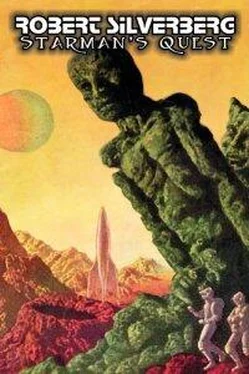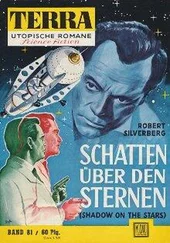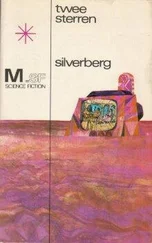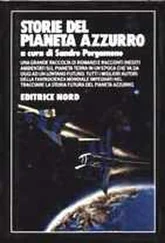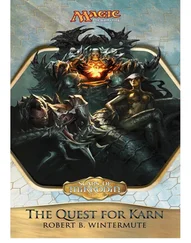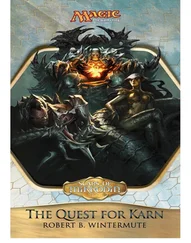Robert Silverberg - Starman's Quest
Здесь есть возможность читать онлайн «Robert Silverberg - Starman's Quest» весь текст электронной книги совершенно бесплатно (целиком полную версию без сокращений). В некоторых случаях можно слушать аудио, скачать через торрент в формате fb2 и присутствует краткое содержание. Год выпуска: 1958, Издательство: Gnome Press, Жанр: Фантастика и фэнтези, на английском языке. Описание произведения, (предисловие) а так же отзывы посетителей доступны на портале библиотеки ЛибКат.
- Название:Starman's Quest
- Автор:
- Издательство:Gnome Press
- Жанр:
- Год:1958
- ISBN:нет данных
- Рейтинг книги:3 / 5. Голосов: 1
-
Избранное:Добавить в избранное
- Отзывы:
-
Ваша оценка:
- 60
- 1
- 2
- 3
- 4
- 5
Starman's Quest: краткое содержание, описание и аннотация
Предлагаем к чтению аннотацию, описание, краткое содержание или предисловие (зависит от того, что написал сам автор книги «Starman's Quest»). Если вы не нашли необходимую информацию о книге — напишите в комментариях, мы постараемся отыскать её.
Starman's Quest — читать онлайн бесплатно полную книгу (весь текст) целиком
Ниже представлен текст книги, разбитый по страницам. Система сохранения места последней прочитанной страницы, позволяет с удобством читать онлайн бесплатно книгу «Starman's Quest», без необходимости каждый раз заново искать на чём Вы остановились. Поставьте закладку, и сможете в любой момент перейти на страницу, на которой закончили чтение.
Интервал:
Закладка:
“Yes, that’s the book. I’ll take it.”
His first stop on his round-the-globe jaunt was London, where Cavour had been born and educated more than thirteen centuries before. The stratoliner made the trip across the Atlantic in a little less than three hours; it took half an hour more by Overshoot from the airport to the heart of London.
Somehow, from Cavour’s few autobiographical notes, Alan had pictured London as a musty old town, picturesque, reeking of medieval history. He couldn’t have been more wrong. Sleek towers of plastic and concrete greeted him. Overshoots roared by the tops of the buildings. A busy network of bridges connected them.
He went in search of Cavour’s old home in Bayswater, with the nebulous idea of finding some important document wedged in the woodwork. But a local security officer shook his head as Alan asked for directions.
“Sorry, lad. I’ve never heard of that street. Why don’t you try the information robot up there?”
The information robot was a blocky green-skinned synthetic planted in a kiosk in the middle of a broad well-paved street. Alan approached and gave the robot Cavour’s thirteen-century-old address.
“There is no record of any such address in the current files,” the steely voice informed him.
“No. It’s an old address. It dates back to at least 2570. A man named Cavour lived there.”
The robot digested the new data; relays hummed softly within it as it scanned its memory banks. Finally it grunted, “Data on the address you seek has been reached.”
“Fine! Where’s the house?”
“The entire district was demolished during the general rebuilding of London in 2982-2997. Nothing remains.”
“Oh,” Alan said.
The London trail trickled out right then and there. He pursued it a little further, managed to find Cavour’s name inscribed on the honor role of the impressive London Technological Institute for the year 2529, and discovered a copy of Cavour’s book in the Institute Library. There was nothing else to be found. After a month in London, Alan moved on eastward across Europe.
Most of it was little like the descriptions he had read in the Valhalla’s library. The trouble was that the starship’s visits to Earth were always at least a decade behind, usually more. Most of the library books had come aboard when the ship had first been commissioned, far back in the year 2731. The face of Europe had almost totally altered since then.
Now, shiny new buildings replaced the ancient houses which had endured for as much as a thousand years. A gleaming bridge linked Dover and Calais; elsewhere, the rivers of Europe were bridged frequently, providing easy access between the many states of the Federation of Europe. Here, there, monuments of the past remained—the Eiffel Tower, absurdly dwarfed by the vast buildings around it, still reared its spidery self in Paris, and Notre Dame still remained as well. But the rest of Paris, the ancient city Alan had read so much of—that had long since been swept under by the advancing centuries. Buildings did not endure forever.
In Zurich he visited the Lexman Institute for Space Travel, a magnificent group of buildings erected on the royalties from the Lexman Spacedrive. A radiant statue sixty feet high was the monument to Alexander Lexman, who in 2337 had first put the stars within the reach of man.
Alan succeeded in getting an interview with the current head of the Institute, but it was anything but a satisfactory meeting. It was held in an office ringed with mementoes of the epoch-making test flight of 2338.
“I’m interested in the work of James H. Cavour,” Alan said almost immediately—and from the bleak expression that appeared on the scientist’s face, he knew he had made a grave mistake.
“Cavour is as far from Lexman as possible, my friend. Cavour was a dreamer; Lexman, a doer.”
“Lexman succeeded—but how do you know Cavour didn’t succeed as well?”
“Because, my young friend, faster-than-light travel is flatly impossible. A dream. A delusion.”
“You mean that there’s no faster-than-light research being carried on here?”
“The terms of our charter, set down by Alexander Lexman himself, specify that we are to work toward improvements in the technique of space travel. It said nothing about fantasies and daydreams. No—ah—hyperdrive research is taking place at this institute, and none will take place so long as we remain true to the spirit of Alexander Lexman.”
Alan felt like crying out that Lexman was a bold and daring pioneer, never afraid to take a chance, never worried about expense or public reaction. It was obvious, though, that the people of the Institute had long since fossilized in their patterns. It was a waste of breath to argue with them.
Discouraged, he moved on, pausing in Vienna to hear the opera—Max had always intended to spend a vacation with him in Vienna, listening to Mozart, and Alan felt he owed it to Hawkes to pay his respects. The operas he saw were ancient, medieval in fact, better than two thousand years old; he enjoyed the tinkly melodies but found some of the plots hard to understand.
He saw a circus in Ankara, a football game in Budapest, a nullgrav wrestling match in Moscow. He journeyed to the far reaches of Siberia, where Cavour had spent his final years, and found that what had been a bleak wasteland suitable for spaceship experiments in 2570 was now a thriving modern city of five million people. The site of Cavour’s camp had long since been swallowed up.
Alan’s faith in the enduring nature of human endeavor was restored somewhat by his visit to Egypt—for there he saw the pyramids, nearly seven thousand years old; they looked as permanent as the stars.
The first anniversary of his leaving the Valhalla found him in South Africa; from there he travelled eastward through China and Japan, across the highly industrialized islands of the Far Pacific, and from the Philippines he returned to the American mainland by jet express.
He spent the next four months travelling widely through the United States, gaping at the Grand Canyon and the other scenic preserves of the west. East of the Mississippi, life was different; there was barely a stretch of open territory between York City and Chicago.
It was late in November when he returned to York City. Jesperson greeted him at the airfield, and they rode home together. Alan had been gone a year; he was past eighteen, now, a little heavier, a little stronger. Very little of the wide-eyed boy who had stepped off the Valhalla the year before remained intact. He had changed inwardly.
But one part of him had not changed, except in the direction of greater determination. That was the part that hoped to unlock the secret of faster-than-light travel.
He was discouraged. His journey had revealed the harsh fact that nowhere on Earth was research into hyperdrive travel being carried on; either they had tried and abandoned it as hopeless, or, like the Zurich people, they had condemned the concept from the start.
“Did you find what you were looking for?” Jesperson asked.
Alan slowly shook his head. “Not a hint. And I really covered ground.” He stared at the lawyer a moment. “How much am I worth, now?”
“Well, offhand—” Jesperson thought for a moment. “Say, a million three hundred. I’ve made some good investments this past year.”
Alan nodded. “Good. Keep the money piling up. I may decide to open a research lab of my own, and we’ll need every credit we’ve got.”
But the next day an item arrived in the morning mail which very much altered the character of Alan’s plans for the future. It was a small but thick package, neatly wrapped, which bore as return address the name Dwight Bentley , with a London number.
Читать дальшеИнтервал:
Закладка:
Похожие книги на «Starman's Quest»
Представляем Вашему вниманию похожие книги на «Starman's Quest» списком для выбора. Мы отобрали схожую по названию и смыслу литературу в надежде предоставить читателям больше вариантов отыскать новые, интересные, ещё непрочитанные произведения.
Обсуждение, отзывы о книге «Starman's Quest» и просто собственные мнения читателей. Оставьте ваши комментарии, напишите, что Вы думаете о произведении, его смысле или главных героях. Укажите что конкретно понравилось, а что нет, и почему Вы так считаете.
